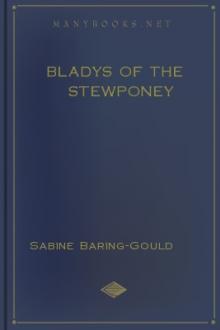The Broom-Squire - Sabine Baring-Gould (life books to read .txt) 📗

- Author: Sabine Baring-Gould
Book online «The Broom-Squire - Sabine Baring-Gould (life books to read .txt) 📗». Author Sabine Baring-Gould
She stood before the place where he kept his articles of value, and mustered them, without much interest. There were bottles of drenches for cattle, and pots of ointment for rubbing on sprains, and some account books. That was all.
But among the bottles was one that was small, of dark color, with an orange label on it marked with a boldly drawn skull and crossbones, and the letters printed on it, "Poison."
This was the phial containing the medicine, the name of which she could not recall, that the doctor had given to her husband to take in the event of his sleeplessness continuing to trouble him. The word "poison" was frightening, and the death's head still more so. But she recalled what the surgeon had said, that the result of taking a small dose would be to encourage sleep, and of an overdose to send into a sleep from which there would be no awaking.
Mehetabel could hardly repress a smile, though it was a sad one, as she thought of her husband's suspicions lest she should misuse the draught on him. But her bosom heaved, and her heart beat as she continued to look at it.
She needed but to extend her hand and she had the means whereby all her sorrows and aches of heart would be brought to an end. It was not as if there were any prospect before her of better times. If sickness had failed to soften and sweeten the temper of the Broom-Squire, then nothing would do it. Before her lay a hideous future of self-abnegation, or daily, hourly misery, under his ill-nature; of continuous torture caused by his cruel tongue. And her heart was not whole. She still thought of Iver, recalled his words, his look, the clasp of his arm, his kiss on her lips.
Would the time ever arrive when she could think of him without her pulse bounding, and a film forming over her eyes?
Would it not be well to end this now? She had but to sip a few drops from this bottle and then lay her weary head, and still more weary heart, on the bed, and sleep away into the vast oblivion!
She uncorked the bottle and smelt the laudanum. The odor was peculiar, it was unlike any other with which she was acquainted. She even touched the cork with her tongue. The taste was not unpleasant.
Not a single drop had been taken from the phial. It was precisely in the condition in which it had arrived.
If she did not yield to the temptation, what was it that stayed her? Not the knowledge that the country of the Gergesenes lay southeast of the Lake of Tiberias, otherwise called the Sea of Galilee; nor that the "lily of the field" was the Scarlet Martagon; nor that the latitude and longitude of Jerusalem were 31 deg. 47 min. by 53 deg. 15 min., all which facts had been acquired by her in the Sunday-school; but that which arrested her hand and made her replace the cork and bottle was the sight of a little white garment lying on the chair from which she had risen.
Just then she heard her husband's voice, and startled and confused by what had passed through her mind, she locked the cupboard, and without consideration slipped the key into her pocket. Then gathering up the little garment she went into another room.
Bideabout did not miss the key, or remember that he had not locked up the cupboard, for three days. The bottle with drench he had retained in the stable.
When the old horse recovered, or showed signs of convalescence, then Bideabout took the bottle, went to his room, and thrust his hand into his pocket for the key that he might open the closet and replace the drench.
Then, for the first time, did he discover his loss. He made no great disturbance about it when he found out that the key was gone, as he took for granted that it had slipped from his pocket in the stable, or on his way through the yard to it. In fact, he discovered that there was a hole in his pocket, through which it might easily have worked its way.
As he was unable to find any other key that would fit the lock, he set to work to file an odd key down and adapt it to his purpose. Living as did the squatters, away from a town, or even a large village, they had learned to be independent of tradesmen, and to do most things for themselves.
Nor did Mehetabel discover that she was in possession of the key till after her husband had made another that would fit. She had entirely forgotten having pocketed the original key. Indeed she never was conscious that she had done it. It was only when she saw him unlock the closet to put away the bottle of horse medicine that she asked herself what had been done with the key. Then she hastily put her hand into her pocket and found it.
As Jonas had another, she did not think it necessary for her to produce the original and call down thereby on herself a torrent of abuse.
She retained it, and thus access to the poison was possible to those two individuals under one roof.
CHAPTER XXVIII.
A THREAT.
One Sunday, the first snow had fallen in large flakes, and as there had been no wind it had covered all things pretty evenly--it had laden the trees, many of which had not as yet shed their leaves. Mehetabel had not gone to church because of this snow; and Jonas had been detained at home for the same reason, though not from church. If he had gone anywhere it would have been to look for holly trees full of berries which he might cut for the Christmas sale of evergreens.
Towards noon the sun suddenly broke out and revealed a world of marvellous beauty. Every bush and tree twinkled, and as the rays melted the snow the boughs stooped and shed their burdens in shining avalanches.
Blackbirds were hopping in the snow, and the track of hares was distinguishable everywhere.
As the sun burst in at the little window it illumined the beautiful face of Mehetabel and showed the delicate rose in her cheeks, and shone in her rich dark hair, bringing out a chestnut glow not usually visible in it.
Jonas, who had been sitting at his table working at his accounts, looked up and saw his wife at the window contemplating the beauty of the scene. She had her hands clasped, and her thoughts seemed to be far away, though her eyes rested on the twinkling white world before her.
Jonas, though ill-natured and captious, was fond of his wife, in his low, animal fashion, and had a coarse appreciation of her beauty. He was so far recovered from his accident that he could sleep and eat heartily, and his blood coursed as usual through his veins.
The very jealousy that worked in him, and his hatred of Iver, and envy of his advantages of youth, good looks, and ease of manner, made him eager to assert his proprietorship over his wife.
He stepped up to her, without her noticing his approach, put his right arm round her waist and kissed her.
She started, and thrust him back. She was far away in thought, and the action was unintentional. In very truth she had been dreaming of Iver, and the embrace chimed in with her dream, and the action of shrinking and repulsion was occasioned by the recoil of her moral nature from any undue familiarity attempted by Iver.
But the Broom-Squire entirely misconceived her action. With quivering voice and flashing eyes, he said--
"Oh, if this had been Iver, the daub-paint, you would not have pushed me away."
Her eyebrows contracted, and a slight start did not pass unnoticed.
"I know very well," he said, "of whom you were thinking. Deny it if you can? Your mind was with Iver Verstage."
She was silent. The blood rushed foaming through her head; but she looked Bideabout steadily in the face.
"It is guilt which keeps you silent," he said, bitterly.
"If you are so sure that I thought of him, why did you ask?" she replied, and now the color faded out of her face.
Jonas laughed mockingly.
"It serves me right," he said in a tone of resentment against himself. "I always knew what women were; that they were treacherous and untrue; and the worst of all are those who think themselves handsome; and the most false and vicious of all are such as have been reared in public-houses, the toast of drunken sots."
"Why, then, did you take me?"
"Because I was a fool. Every man commits a folly once in his life. Even Solomon, the wisest of men, committed that folly; aye, and many a time, too, for of wives he had plenty. But then he was a king, and folly such as that mattered not to him. He could cut off the head of, or shoot down any man who even looked at or spoke a word to any of his wives. And if one of these were untrue to him, he would put her in a sack and sink her in the Dead Sea, and--served her right. To think that I--that I--the shrewd Broom-Squire, should have been so bewitched and bedeviled as to be led into the bog of marriage! Now I suffer for it." He turned savagely on his wife, and said: "Have you forgotten that you vowed fidelity to me?"
"And you did you not swear to show me love?"
He broke into a harsh laugh.
"Love! That is purely! And just now, when I attempted to snatch a kiss, you struck me and thrust me off, because I was Jonas Kink, and not the lover you looked for?"
"Jonas!" said Mehetabel, and a flame of indignation started into her cheek, and burnt there on each cheek-bone. "Jonas, you are unjust. I swore to love you, and Heaven can answer for me that I have striven hard to force the love to come where it does not exist naturally. Can you sink a well in the sand-hill, and compel the water to bubble up? Can you drain away the moor and bid it blossom like a garden? I cannot love you--when you do everything to make me shrink from you. You esteem nothing, no one, that is good. You sneer at everything that is holy; you disbelieve in everything that is honest; you value not the true, and you have no respect for suffering. I do not deny that I have no love for you--that there is much in you that makes me draw away--as from something hideous. Why do not you try on your part to seek my love? Instead of that, you take an ingenious pleasure in stamping out every spark of affection, in driving away every atom of regard, that I am trying so hard to acquire for you. Is all the strivin' to be on my side?--all the thought and care to be with me? A very little pains on your part, some small self-control, and we should get to find common ground on which we could meet and be happy. As to Iver Verstage, both he and I know well enough that we can never belong to each other."
"Oh, I





Comments (0)